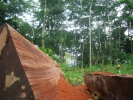 Thanks to a technologically innovative system, unveiled today by the Rainforest Foundation UK together with its Cameroonian partner Foder (Forêts et Développement Rural), remote forest communities can now report illegal logging on their lands in ‘real-time’. A ground-breaking technology, unveiled today by the Rainforest Foundation UK, gives forest peoples the opportunity to send near-instantaneous, highly geographically accurate reports of illegal felling of trees, such as by timber or palm oil companies, from anywhere in the world, even where there is no mobile, phone or internet connectivity.
Thanks to a technologically innovative system, unveiled today by the Rainforest Foundation UK together with its Cameroonian partner Foder (Forêts et Développement Rural), remote forest communities can now report illegal logging on their lands in ‘real-time’. A ground-breaking technology, unveiled today by the Rainforest Foundation UK, gives forest peoples the opportunity to send near-instantaneous, highly geographically accurate reports of illegal felling of trees, such as by timber or palm oil companies, from anywhere in the world, even where there is no mobile, phone or internet connectivity.
Information on illegal activity in the forest can now be collected using a tablet computer or smartphone and then transmitted to an online map via a satellite modem transmitter in as little as 20 seconds - costing around the same as a standard text message. The live incident reports show where urgent action is required to prevent deforestation. The system has been already tested in the rainforests of Cameroon, revealing 20 potential incidences of illegal logging.
‘Pascal’ (full name withheld for safety reasons), from one of the communities in Cameroon involved in the recent tests, said: “Illegal logging is a huge threat to our community. RFUK’s real-time monitoring system will allow us to report infractions and to get them to the all stakeholders at the same time so that the perpetrators can be identified and punished”.
Using an easily modified icon-based ‘incident reporting’ system, the technology can potentially be adapted to different kinds of forest monitoring, including wildlife populations, poaching, human rights abuses, or the implementation of carbon payment mechanisms such as REDD.
Simon Counsell, Executive Director of the Rainforest Foundation UK said: “Our ‘real time’ technology is potentially a game-changer, as it helps empower forest people even in the remotest areas, and could transform the way that forests are monitored and governed. It can be an important and cost-effective complement to satellite-based monitoring, providing ‘crowd-sourced’ qualitative data. We are inviting governments of rainforest countries to work with us on a full-scale test of how community-based monitoring can be linked to formal enforcement mechanisms”.


